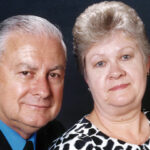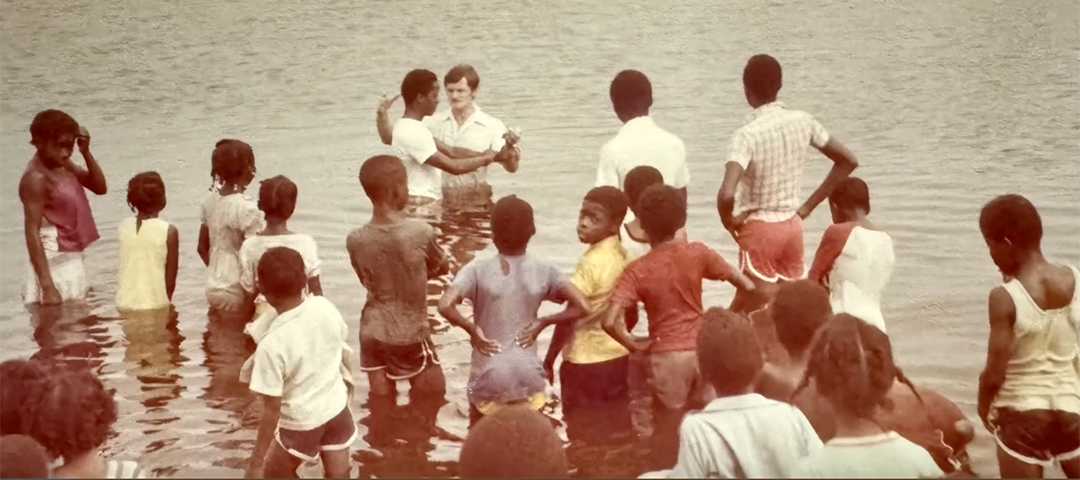
2024 Legacy Missionaries: Bill & Jeanette Gibson
April 23, 2024
When Culture and Christianity Meet
May 7, 2024Since 1950, BMA missionaries have been sent to foreign fields, leaving a legacy of faith, perseverance, and obedience to the call to serve. Sometimes those fields are fraught with danger, but the men and women of the BMA are more likely to run into the fire rather than away from it. Why? Because that’s where the lost souls are.
Such is the case with 2024 Legacy Missionary David Dickson, whom God protected when bullets were flying.
Dickson’s parents were from Arkansas but relocated to California where they raised their family until David was fifteen. Ironically, Shelley’s family lived in California just fifteen miles from the Dicksons without ever meeting. The Dicksons moved back to Arkansas when David was fifteen and David finished high school in Walnut Ridge then began attending CBC (Central Baptist College). Shelley enrolled at CBC two years later David and the two began dating.
His Story
David was saved at nine years old and called to preach at thirteen. But he didn’t consider mission work until John and Shirley Ladd sent a letter inviting CBC students to spend the summer with them in Nicaragua. David signed up, and that first trip led to a second one as a six-week summer volunteer. After the first trip to Nicaraugua, he knew the mission field was God’s direction for his life but wanted to confirm it. When the second trip ended, he was sure of the Lord’s calling and had been all his life.
Her Story
Shelley’s father was a pastor, and she was saved in fifth grade as he preached a revival service. During the sermon, her aunt sitting next to her realized she was under conviction, so the two of them went outside where they talked about salvation. After the service, her father joined them and led her to the Lord. Then while attending church camp in Gary, Texas, at fifteen she felt the Lord calling her something but told her she would have to wait. When she met David at CBC she realized that God had not revealed his will to her until she met David, which was the Lord’s plan all along.
Nicaragua
Once the couple understood God’s call on both of their lives, they were ready to get to their first mission field: Nicaraugua. Shelley attended CBC for just one semester and David wanted to drop out of college and get there faster, but CBC President Wassell Burgess encouraged him to finish his degree. Six months after their marriage in 1971, they left for Nicaragua, where Paul Robinson and John and Shirley Ladd were serving when the Dicksons arrived.
Three of their children were born during the seven years they served there and quickly learned the Spanish language that all their children can speak fluently. At the time, there was peace in Nicaragua, no open warfare in the country. In 1977 the Dicksons moved back to the States, and he spent eleven years pastoring in Walnut Ridge, Arkansas.
While there, he realized that pastoring in the States wasn’t for him.
The year after they returned to the U.S. all missionaries had to leave and the communists took over the country. For David and Shelley, it would seem like in just about every country they served, there was tension and unrest.
El Salvador
The Dicksons dealt with the communist takeover of El Salvador and anti-American sentiment the entire year they served in El Salvador. They witnessed people shot in their doorway, bodies lying in the middle of the road, a peace-corp worker compound burned to the ground, and hostages held for a night because they were in the wrong place at the wrong time.
The communists were against any charity, because they would rather the people suffer and join the rebellion. One night, David and Shelley went to dinner at the home of a recent convert who worked for a charitable organization. Their children were with a babysitter at the Dicksons’ home. When the man’s house became surrounded by the military, their babysitter took the Dickson children to her home for the night. Intimidation was their motive, so in the morning it was all over.
During the day nothing happened, but after dark, violence erupted and even the police wouldn’t go out after dark.
Despite the danger, the Dicksons remained in El Salvador because God was blessing the church and bringing lost souls to Christ. Because of the constant nighttime gunfire, however, the children slept in David and Shelley’s room until the morning when everyone began going to market and living life as normal . . . until one final incident:
While watching a nighttime news broadcast, the family heard gunshots and saw that in front of their house the president’s brother – who owned a bus line – had parked his buses, which the guerillas often torched. To prevent them from doing so, guards on the buses began shooting.
David’s son was with him in the living room as a guard was shot in their doorway.
They left El Salvador two days later.
The year after they returned to the U.S. all missionaries had to leave and the communists took over the country. For David and Shelley, it would seem like in just about every country they served, there was tension and unrest.
Honduras
The Dicksons were in Honduras for eleven years as the Garifuna story, chronicled by many BMA writers through the years, continues to unfold. It has resulted in effectively winning a people and language group to Christ, and it all began with a trip to the beach in 1980.
David heard two boys speaking in a language he had never heard, and as a curious linguist, he spoke to them in Spanish, asking them questions about where they were from. In the next months and years, and with the help of professional linguist and translator Lillian Howland, David developed a relationship with the Garifuna that continues to this day. After years of learning a language that had never been fully translated or written down, the Garifuna hailed him as a hero when they once ridiculed and spat on him.
Ricardo Herrera was among those who ridiculed David’s efforts to share the gospel and vigorously opposed his wife’s conversion. In a rage, he went to the church with harmful intentions, but instead received new life in Christ. Ricardo became a church leader, even naming one of his sons after David. Sadly, the son died. Garifuna traditions for a proper wake include liquor and vulgar dancing to keep the ancestors happy, but Ricardo refused to allow either one. People warned him that no one would attend the wake, and without mourners, the spirits would come and take away more family members. But he told them, “They can come and take each of my children one by one and I still won’t participate.”
Brother David says, “It’s amazing to see what happens with a culture after an entire generation has heard the gospel. The adults now in church are the first generation of Garifunas to be raised in church. Seeing stable marriages and kids raised to serve the Lord means there is no more influence of spiritism, and animistic beliefs are longer celebrated.” At first, David was ridiculed, now people yell out “God bless you!” when he walks down the street.
Guatemala
The Dicksons left Honduras in 1991 and served in Guatemala for a short period. It was not a fruitful time, and they never understood why God led them there. It was a time of discouragement and complete lack of visible fruit. However, while in Guatemala, they were able to work with the Garifunas there. The Dicksons left Guatemala in 1993 and went back to the States with no idea what was next.
Puerto Rico
After leaving Guatemala, David and Shelley thought that was it . . . No more mission fields. But Missions Director Don Collins told them they had not lost confidence in David and to find out what God wanted them to do next. He suggested that because of his linguistic skills, maybe David could learn Russian since the Cold War was over and missionaries were able to share the gospel there.
So they went to Russia to see Bill Gibson, who was in Czech Republic and struggling to learn the language. The two men cried together in frustration without resolving the issue of where to serve, but Bill told David about his son who lived in Puerto Rico and was an assistant manager at a WalMart in Costa Rica. Bill, Jr. told David that he couldn’t find a true Baptist church, so the Dicksons went to Puerto Rico to plant a church and discovered an entirely different church-planting experience.
They had never been part of a church of primarily middle class people. On every other mission field, David was the wealthiest and most educated. But in Puerto Rico, the church was made up of doctors, lawyers and teachers. Soon after they arrived there, WalMart transferred Bill, Jr., but within six to seven years, the church was running 700, and for two years in a row, they baptized over 100 people.
The Dicksons served in Puerto Rico for fourteen years until God led him to leave the church in Puerto Rico. Normally, pastors don’t leave a church when all is well, but when David was diagnosed with his first bout of cancer, he didn’t feel like he could give the church all it needed. He was 59 and felt the Lord saying,”It’s time to go.” It had been the most successful time of ministry in his life, so to step away was difficult and didn’t make sense.
He told the Lord, “I don’t know how you’ll beat this (cancer), but if you want me to leave, I’ll do so, just don’t let me doubt this decision.” For the next ten years, he served as Regional Coordinator of Latin America, a perfect way to serve the countries he was so burdened for.

